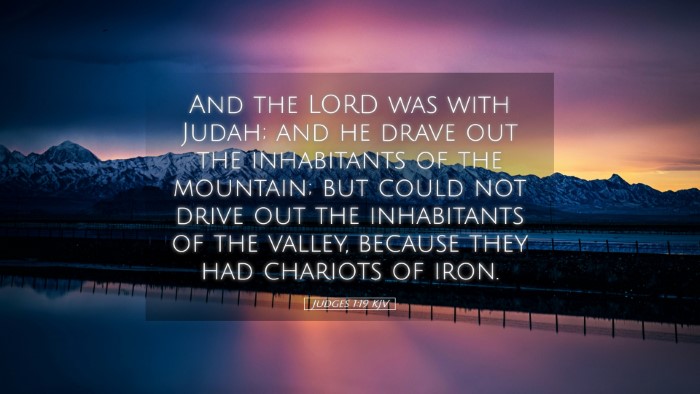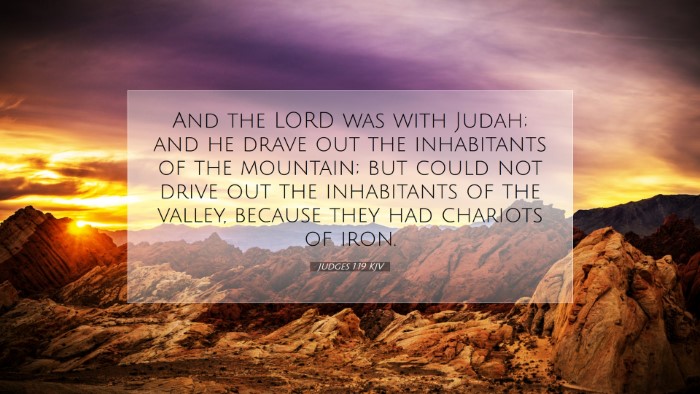Commentary on Judges 1:19
Judges 1:19 states, "And the LORD was with Judah; and he drove out the inhabitants of the mountain; but could not drive out the inhabitants of the valley, because they had chariots of iron." This verse encapsulates the complexities of Israel's early conquests in the Promised Land, illustrating both divine support and human limitations.
Divine Presence and Support
The phrase "the LORD was with Judah" emphasizes the assurance of God's presence as a crucial factor in Israel's military efforts. Matthew Henry notes that God's presence is often the deciding factor in battles, providing both strength and guidance. This reinforces the theological tenet that success in spiritual and temporal endeavors hinges upon divine support.
Albert Barnes points out that Judah’s accomplishments can be attributed to their reliance on God. The victories are not merely attributed to Judah's might but to the LORD’s empowering presence. This insight resonates with the Christian belief in the importance of seeking God’s will and support in every undertaking.
Conquest of the Mountain Inhabitants
The successful expulsion of the inhabitants from the mountains signifies Judah's spiritual and physical dominance in the rugged terrain. Adam Clarke suggests that the mountainous regions represented greater challenges to physical warfare, yet Judah triumphed due to their faithfulness. This serves as a metaphor for overcoming significant spiritual hurdles through reliance on God.
-
Mountain Symbolism: Mountains often symbolize high places of power and difficulty, further emphasizing Judah's victories as miraculous, given the formidable nature of their enemies.
-
Spiritual Lessons: The victories in the mountains remind believers that with God, even the steepest challenges can be surmounted.
The Challenge of the Valley
In contrast, Judah’s inability to defeat the inhabitants of the valley due to their “chariots of iron” reflects a significant theme in biblical warfare: the limitations of human resources against seemingly insurmountable odds. Matthew Henry comments on the chariots of iron as symbols of military strength that intimidate and hinder faith-driven efforts.
The presence of these chariots can be contrasted with God’s might. Albert Barnes articulates that while Judah thrived in the mountains, the valleys remained a struggle; this underscores the notion that faith alone is sometimes not enough when confronted with overwhelming technological advantages. This speaks to the contemporary Christian experience, where believers might face modern 'challenges of iron' that appear invincible.
The Balance of Faith and Realism
The narrative encapsulates a critical lesson regarding faith in the face of adversity. Adam Clarke reminds us that while faith is essential, it is equally important to recognize the realities of the situation. Judah’s failure to capture the valley presents a complex reality where faith must confront practical challenges.
-
Understanding Limitations: Christians are called to recognize their limitations while having confidence in God’s power. This acknowledgment does not weaken faith but refines it, urging believers to seek God’s wisdom and strength in all aspects of life.
-
Encouraging Reflection: This verse invites introspection regarding areas in one’s life that resemble the ‘iron chariots’—those seemingly insurmountable challenges that require both faith and practical action.
Historical and Theological Implications
Historically, this account illustrates the initial conquests of Israel and sets a precedent for understanding the cyclical nature of Israel's faithfulness and struggles throughout the Book of Judges. As Clarke elaborates, these patterns reveal the depth of Israel's relationship with God—marked by periods of faithfulness followed by lapses into despair when confronted with trials.
Theologically, the interplay of divine assistance and human limitation is mirrored in the Christian experience of salvation and sanctification. Believers understand that while they are called to act in faith, it is ultimately God who provides the victory. This principle is echoed throughout Scripture, reinforcing the centrality of God's sovereignty in human affairs.
Concluding Thoughts
Judges 1:19 serves as a poignant reminder of the duality of faith and reality. The verse invites pastors, students, theologians, and scholars alike to consider how they might be called to confront their own 'iron chariots.' It emphasizes the importance of trusting in God’s presence while also being realistic about the battles that lie ahead.
Ultimately, it encourages an attentive heart that seeks God’s will in each circumstance, recognizing that true victory lies in obedience, reliance on divine assistance, and an understanding of the complexities of life in a fallen world.


